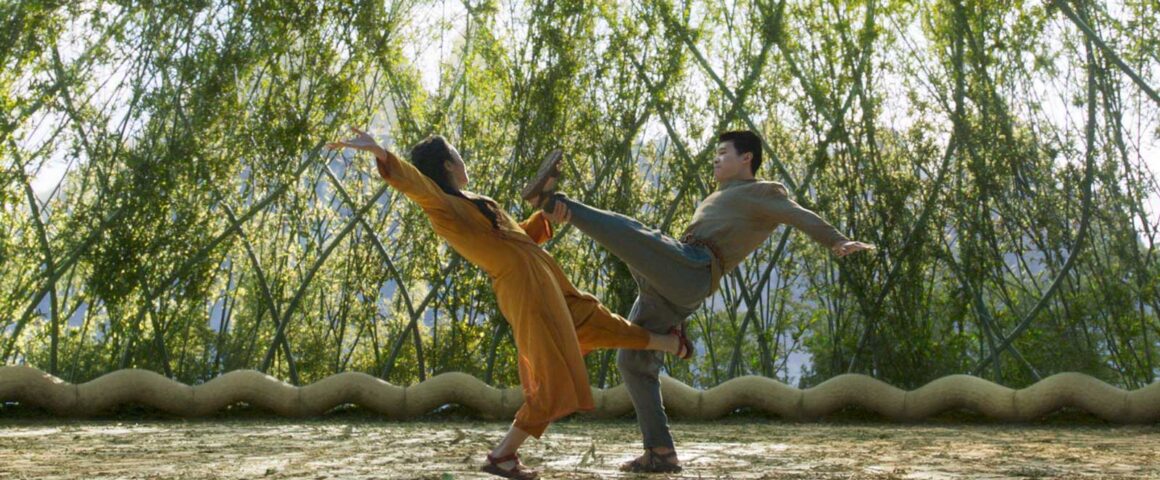It has become a cliché to identify that Marvel Studios combine the superhero genre with other genres. From conspiracy thriller in “Captain America: The Winter Soldier” to buddy comedy in “Thor: Ragnarok” to space opera in “Guardians of the Galaxy,” Kevin Feige and the various writers, directors, editors, actors, composers, cinematographers and more that work on these gargantuan blockbusters place remarkable individuals in a range of generic frameworks where exceptional abilities and an unwavering moral compass win the day.
Within this established formula and with well over 20 films in the canon, there is a risk of repetition and over-familiarity, which can breed boredom and contempt. Under the direction of Destin Daniel Cretton, Shang-Chi and the Legend of the Ten Rings is infused with sensibilities and stylistics of the martial arts film (a Marvtial arts film, if you will), giving this entry in the Marvel Cinematic Universe a refreshing edge that helps it stand out among its siblings. This is despite the familiar origin story: Shaun/Shang-Chi (Simu Liu, “Women Is Losers”), is living a normal life when extraordinary circumstances pull him into a secret world where he must embrace his destiny. It’s a well-trodden path, which is perhaps ironic considering the film’s repeated emphasis on hidden paths and concealed doors, but the familiarity of the tale is a strength rather than a weakness. We’ve been enjoying this type of hero’s journey for literally centuries, so it is surely churlish to complain about what works, especially when it works as beautifully as it does here.
For Shang-Chi and the Legend of the Ten Rings is beautifully told and presented. The title is interesting, because while we get plenty of Shang-Chi, the Ten Rings themselves remain tantalizing legendary. A prologue narrated to the young Shaun (a device also used in “Black Panther”) by his mother Li (Fala Chen, “Revenge of the Green Dragons”), mentions that his father Xu Wenwu (Tony Chiu-Wai Leung, “The Grandmaster”) found the Rings long ago, but that’s all we get. The Rings are not even the McGuffin of the story, simply used by Wenwu to establish and maintain power with his secret society, hinted at in earlier Marvel installments (see “Iron Man” and “Iron Man 3” especially). Wenwu demands that his son as well as his daughter Xialing (Meng’er Zhang) join him on an obsessive quest, a quest that begins in the prologue, takes a major detour but then proceeds from San Francisco to Macau to a hidden village in a moving bamboo forest (if that seems weird, did you miss “Doctor Strange” and “Ant-Man and the Wasp”?). Along the way we are treated to some family drama, familiar faces (hello, Benedict Wong!) and what we’re really here for: Martial arts combat!
The combat is gorgeously handled. From a super-charged yet sensual and flirtatious contest in the prologue to the introduction of Shaun’s skills in a bus to a battle fought on scaffolding to the spectacular climax, Cretton leans into the opportunities afforded by this genre. The martial arts genre varies from the fantasy wuxia of Chinese cinema like “Hero” and “House of Flying Daggers” to contemporary-set kung fu adventures like “Enter The Dragon” and urban thrillers like “The Raid,” not to mention the action comedies of Jackie Chan and his ilk. The combat sequences, choreographed by Andy Cheng, are balletic both in terms of the performers’ movements and also William Pope’s camera, utilizing the style of the genre. As Shaun ducks in and out of blows, bounces off walls and strikes at multiple opponents, the camera both captures the exquisite movement of the human body while also drawing the viewer into this movement. The Rings as well as other superpowers do not overwhelm the artistry on display, especially in moments when combatants seem to take command of the elements. A sequence in a super-charged fighting ring carries serious heft while the clashes between Shaun and Wenwu demonstrate the major tensions between father and son.
Family indeed forms the central tension of the film, with Wenwu willing to do anything for his notion of family while Shaun urges caution and restraint to no avail. The two men form a great contrast, with Leung giving Wenwu a stoic façade, ably supported by the Rings, while also expressing that this man is deeply broken. Shaun is amiable but also pained, and the steady narrowing of the gap between him and Wenwu is communicated through Liu’s performance that is as much physical as verbal. A major delight of the film, however, is Awkwafina (“Paradise Hills”) as Shaun’s best friend Katy. Much like Darcy (Kat Dennings) in “Thor”, “Thor: The Dark World” and “WandaVision,” Katy is an anchor character, giving the audience some grounding in the increasingly bizarre events, especially by providing levity and laughs as well as excellent driving, archery and karaoke. Speaking of laughs, there is a hilarious appearance by another familiar face who comes with an adorable animal companion. Cynically, one can read that aspect as something Disney will exploit for maximum merchandise, but that does not mean that Morris is not a great part of the film.
Speaking of not being cynical, the film displays a refreshing confidence in its material and audience. After the annoying insistence on accented English in “Black Widow,” Shang-Chi and the Legend of the Ten Rings has long stretches of dialogue in subtitled Mandarin (which could almost be an in-joke about audiences accepting Mandarin). Furthermore, the range of characters ensures that we do not have exoticized “Others,” but detailed and varied human beings. Much like “Black Panther,” this film demonstrates the diverse world that Marvel depicts and, while this is admittedly all in the service of a deeply problematic multinational corporation, it is nonetheless encouraging to see mainstream entertainment making diversity mainstream. Disney may be laughing all the way to the bank, but the rest of us can laugh our way to the karaoke bar thanks to this vibrant, enervating and inclusive fantasy adventure.



